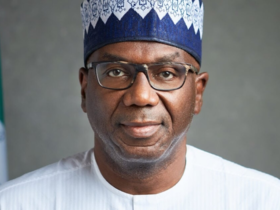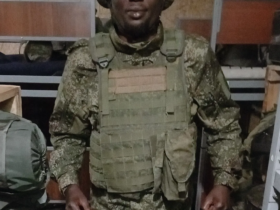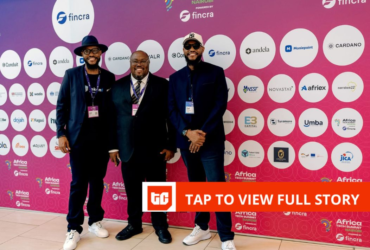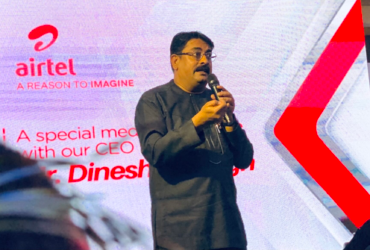On a sunny day in mid-2020, Malobi Ogbechie stepped off a ferry into Lagos’ Apapa port. He paced the busy port for hours, asking dockworkers how to ship his small batches of fonio, a nutrient-rich West African grain, by sea to save on expensive air freight that was eating into his margins. Unable to afford shipping a full container, he asked around for shippers who allowed cargo sharing with other exporters—groupage, as it’s called. He found none.
Five years later, Ogbechie is no longer a struggling exporter but a founder trying to solve this problem with Kadan Kadan, his logistics startup, which lets small businesses export their goods in shared containers at a fraction of the cost of air freight. Kadan Kadan now serves tens of businesses, including ReelFruit, a leading agri-tech startup known for its dried fruit snacks.
Early life and education in England
In 2002, at the age of ten, Ogbechie landed in Somerset, England, a world away from the bustle of Port Harcourt in the Nigerian south, where he’d spent his early years. His parents, seeing education as a gateway to economic opportunity, enrolled him and his brothers in boarding school. “It was alright,” he recalled at Pitstop, the Lagos restaurant where we met.
As one of the few Black students in their school, Malobi and his siblings navigated a subtle undercurrent of racism. “There were little racist jokes here and there,” he said, reflecting on a UK that, in the early 2000s, felt less inclusive than today. “A group of Black guys couldn’t walk into a building together without issues.” At first, Malobi admitted, this atmosphere created a “victim mindset,” the weight of which could’ve defined him had he not learned to shake it off.
At the University of Bath, years later, he enrolled in European Studies with French and German, a program that promised language fluency and a deep dive into European politics and economics. “I speak both languages,” he said. The French came in handy in his later African travels.
It was at Bath that Malobi began to see Africa as a continent sidelined in global markets. After Bath, he pursued a master’s in international relations at Regents University London. Malobi recalled an almost insufferable curiosity about the continent during mostly Europe-focused classes. “I could feel my questions made some students and lecturers uncomfortable.”
After graduating, Ogbechie had a 3-month stint at a tech firm providing business training solutions but was fired due to a mismatch in corporate culture. “I had to learn how to fit in over time,” he recalls. He then secured a position at Panalpina, a global logistics company, as a business development manager for about 17 months, gaining initial knowledge of air and sea freight. Following this, he continued his career in business development roles at market research companies.
Discovering fonio and returning to Nigeria
While working in market research, Ogbechie discovered fonio, a small, grain native to West Africa, primarily grown in Senegal, Mali, Guinea, and Nigeria. He sold it to retailers in London; its nutritional value and African roots made it a unique product at the time.
It was just a side venture until he decided to learn more, he said. His curiosity took him on a two-week journey across West Africa, through Senegal, Gambia, Guinea, and Sierra Leone, where fonio fields stretched under open skies. His French came in handy in the Francophone countries. The journey felt somewhat like a transformative privilege so that after returning to London, he quit his job and moved back to Nigeria to export the grain full-time.
Kadan Kadan: the “little by little” solution
Ogbechie’s return coincided with COVID-19 pandemic lockdowns that swept across the globe in early 2020. Even as global logistics bottlenecks intensified, he continued to source the grain from Nigeria and ship it to his handful of customers via air freight. “I was either breaking even or making minimal profit, just to keep customers abroad happy,” he explained.
Frustrated by the expensive freight prices, Ogbechie looked for groupage services—sea freight logistics enabling small-scale exporters to share container space to cut costs—but found no solutions at the port. “I was asking people on the road if they knew anyone offering this service. No one did,” he said. In hindsight, the service did exist but was largely offline and hard to find organically. “There was a clear gap. Others like me would need this but wouldn’t know where to find it.”
He continued to think about the problem, but only took concrete steps to create a shared container service in 2022 during a short agribusiness course at the Lagos Business School. Tasked with pitching a business idea, Ogbechie presented three concepts: processing kenaf (a versatile West African crop), a food export venture, and the shared container service, which won unanimous support. “Everyone backed the container idea,” he said.
After months of research and networking, he launched Kadan Kadan in 2023.
“Kadan Kadan” is a Hausa phrase that means “little by little.”
Current operations and future plans
Its model was straightforward: groupage, or shared containers, letting multiple businesses pool goods into one sea shipment. “We’re moving cassava flour, dresses, and more overseas,” Malobi said on Arise TV this month, “at a quarter of air freight’s cost.” Air freight to Houston costs $3,500 per ton of garri, while Kadan Kadan’s shared containers shipped the same for $520, covering port fees.
The setup was digital, a web app that let clients track shipments, get quotes, and book space, reducing paperwork that bogged down operations in traditional startups. “The shipping industry isn’t very tech-enabled,” he noted, and his app aimed to change that by offering transparency where manual forms caused delays. It didn’t own ships or warehouses, keeping costs low by partnering with carriers—an asset-light approach enabling scalability through more clients and containers, leading to cheaper per-ton rates.
The first container filled by 80% even without any paid ads, Ogbechie recounted. His rates undercut air shipping by two to three times. Though slower than air freight—30 versus seven days—it was ideal for commoditized goods like garri and plantain flour. “For those products, it’s the most profitable way to export,” Ogbechie said.
The startup’s initial progress faced setbacks due to customs issues in the UK, where some goods were seized because of a lack of awareness regarding import restrictions. On one occasion, the startup had to refund affected customers up to $10,000—a significant amount for a bootstrapped venture. Ogbechie explained his approach: “I don’t want a bad name, so I overcompensate. Or maybe it’s my British upbringing, but while some agents might say, ‘Once it leaves Nigeria, it’s not my problem,’ I take the financial hit to ensure customer satisfaction.”
He says the startup has grown to understand the terrain and these mishaps don’t occur anymore.
In addition to groupage services, Kadan Kadan also offers full-container and refrigerated options. Clients include Reel Fruit, Oma’s Chips, Igbega Farms, and other emerging names in food and agribusiness.
Ogbechie notes that his biggest competitors are small, legacy firms that have been quietly offering similar services for decades through word-of-mouth, without ads or branding.
In hindsight, he realised that his initial obliviousness stemmed from their low online visibility and his unfamiliarity with Nigeria at the time. He is trying to ensure visibility through physical connections at events and with associations, which he says have been playing out well. “After nearly two years, a lot of people in the food business know us,” he said.
Over the next five years, Ogbechie envisions Kadan Kadan evolving into a comprehensive, tech-enabled logistics ecosystem with two key divisions. Kadan Trade will become a sourcing agent in Africa, facilitating connections between African suppliers in at least three key countries. Simultaneously, Kadan Freight, he hopes, will expand to include a fleet of at least ten trucks to handle domestic logistics and efficient transport.
For now, Ogbechie is working to make sure no one ends up at the port like he did five years ago; unable to find a means to affordably ship their African goods to expectant customers.














Leave a Reply